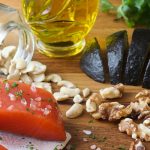Quarantine Cooking to Optimize Health
With people encouraged to stay home during the COVID-19 outbreak, more people than ever are turning to their own kitchens for daily meals.
Cooking at home may be a new practice for many, but for Colin Zhu, DO, a chef and osteopathic physician, it’s one of the best ways to positively impact overall health and well-being. Not only is it more cost-effective to cook in your own kitchen but, Dr. Zhu says, doing so allows each of us complete control over the foods we consume. And each food we add to our plates can either contribute to our wellness — or create the potential for disease within our bodies.
“As a practicing family doctor, I receive a lot of questions about how to improve immunity and what kinds of foods to eat,” Dr. Zhu said. “Healthful foods are essential, not just in terms of protecting us during a pandemic, but also continuing to help protect and optimize our overall health.”
Plants Pack a Nutritional Punch
For the most impactful changes, Dr. Zhu advocates for a whole food, plant-based diet rich in fresh fruits, vegetables, whole grains, beans, and legumes. For those who also eat animal products, such as meat and dairy, he encourages them to focus on adding more antioxidants, fiber, vitamins, and minerals to their diet. “You can do this,” he said, “by doubling, if not tripling, your portions of plant foods. This would be an amazing help toward your overall well-being.”
If you are limiting the amount of grocery store runs you make during this time, there are foods that can offer a healthy boost, while also promising a longer shelf-life. Dr. Zhu recommends shoppers stock up on whole grains, beans, legumes, dry foods, and frozen foods. He also encourages shopping at local ethnic stores for more budget-friendly prices on dried herbs and spices, and less common ingredients like Mexican chiles, ginger, turmeric, or lemongrass.
“Due to our pandemic, there may be a shift toward more emotional eating and reducing physical activity,” Dr. Zhu said. “Therefore, decreasing grazing and actually shifting toward eating less would be more beneficial.”
But if traditional comfort foods are hard to resist during this time, Dr. Zhu assures us there’s still room for them in a healthy, disease-fighting diet.
The trick, he explains, is to make smart swaps for ingredients that pack a bigger punch, nutritionally speaking. When possible, substitute whole, intact foods for processed ones.
Mac and cheese for example, Dr. Zhu says, can be a healthier dish if you substitute white pasta with whole grain, quinoa, or bean pasta. And someone more adventurous in the kitchen may want to try swapping cheese for a vegan option using soaked cashews, which would boost the meal’s nutritional profile even further.
Managing a Sweet Tooth
When it comes to desserts, Dr. Zhu acknowledges that it is tough to avoid them altogether. Instead, he encourages people to practice moderation and focus on more wholesome sources of sweetness, as opposed to artificial ones.
“Artificial sweeteners, such as high fructose corn syrup, can lead the body to create more inflammation. I would recommend avoiding these as much as possible. Better options include molasses and date sugar,” Dr. Zhu said. “When possible, I try to use more whole food ingredients that are naturally sweet, such as sweet potatoes, bananas, and berries.”
There are numerous benefits to cooking at home — but in the midst of a global health crisis, none may be as critical as controlling the nutrients you consume. Preparing your own meals allows for a greater concentration of disease-fighting, immunity-boosting foods that are rich in vitamins, minerals, and antioxidants. For the biggest impact, Dr. Zhu recommends a whole food plant-based diet focused on fresh fruits, vegetables, whole grains, beans, and legumes.
To get any kitchen novice on the right path, Dr. Zhu has shared two plant-based recipes of his own. Do try these at home.
Veg Party Soup Quarantine Style


